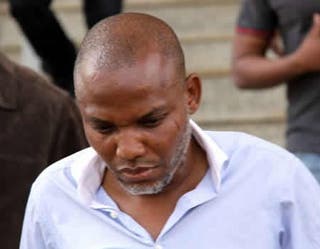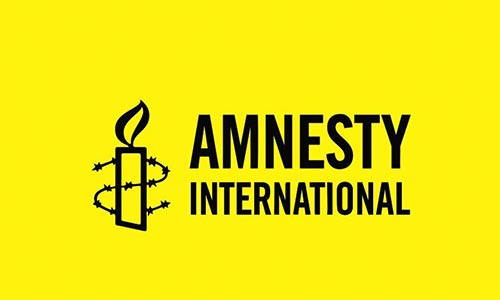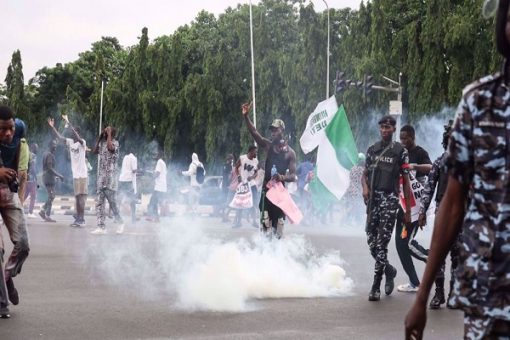
The detained leader of the Indigenous People of Biafra, IPOB, Nnamdi Kanu, on Monday, dragged the Department of State Service, DSS, before the Federal High Court in Abuja, accusing it of grossly violating his fundamental human rights.
Kanu, in the suit he filed through one of his lawyers, Mr. Maxwell Opara, alleged that a doctor engaged by the security agency, has extracted his blood over 21 times.
The IPOB leader bemoaned that despite an order of the court, he has neither been allowed to have a change of clothe nor to practice his religion in detention.
Cited as Respondents in the suit markedly FHC/ABJ/CS/1585/21, are the Director General of the DSS, the DSS and the Attorney-General of the Federation.
The suit was supported by an affidavit of urgency that was deposed to by Kanu’s younger brother, Emmanuel.
Briefing newsmen shortly after he filed the suit, Opara, said when he visited the DSS detention facility last Thursday, the IPOB leader, complained to him that he suspected the doctor extracting his blood to be a quack.
He said that Kanu alleged that his demand for the security agency to grant him access to his medical record, was repeatedly refused.
The affidavit in support of the suit, a copy of which was sighted by Vanguard, read in part: “The Applicant is a Nigerian citizen who is entitled to the enjoyment of the fundamental rights enshrined in chapter 4 of the 1999 Constitution of the Federal Republic of Nigeria as amended and Article 5 and 8 of the African Charter on Human and Peoples Rights (Ratification and enforcement) Act Cap A9 Vol. 1 LFN.
“The Respondents have deprived the Applicant access to facility and material to practice his faith and ultimately prevented the Applicant from praying and/or practicing his faith, and the aforesaid constitute a breach of the Applicant’s right to practice his religion.
“The Respondents prevented the Applicant from having access to a medical practitioner and legal practitioner of his choice.
“The Respondent subjected the Applicant to solitary confinement which is a form of mental and physical torture and as such subjects the Applicant to inhuman and degrading treatment and in turn constitutes a violation of Section 34(1)(a) Constitution of the Federal Republic of Nigeria 1999 as amended and Article 5 of the African Charter on Human and People Rights (Ratification and enforcement) Act Cap A9 Vol. 1 LFN.
“The Applicant’s right not to be subjected to inhuman and degrading treatment and torture/humiliation is enshrined in Section 34(1)(a) Constitution of the Federal Republic of Nigeria 1999 as amended and Article 5 of the African Charter on Human and People Rights (Ratification and enforcement) Act Cap A9 Vol. 1 LFN.
“Order (ii) Rule (i) of the Fundamental Rights (Enforcement Procedure) Rules 209 empowers any person who alleges that any of the fundamental rights to which he is entitled to is being, has been, or is likely to be infringed upon to apply to the court for a redress.
“The Respondents have no justification to have subjected the Applicant to indignity, humiliation, mental torture and inhuman and degrading treatment”.
The suit is among other things, seeking, “An order directing the Respondents to immediately allow the Applicant access to facility and material for the practice of his religion
“An order of this court directing the Respondents to immediately allow the Applicant to appointing an independent Medical Practitioner of his choice from a certified government hospital to review the Applicant’s medical files.
“An order directing the Respondents to allow the Applicant access to a medical practitioner of his choice and a legal practitioner of his choice.
“An order of this court directing the Respondents to immediately remove the Applicant from solitary confinement.
As well as, “An order of perpetual injunction restraining the Respondents, their authorized agents by whatever name so called, from further disturbing or interfering with thnnamdue rights of the Applicant to dignity of human person and freedom thought, conscience and religion or in any way infringing on the constitutional rights of the Applicant as guaranteed by law or from making any attempt capable of violating the Applicant’s rights as guaranteed under the Constitution.


